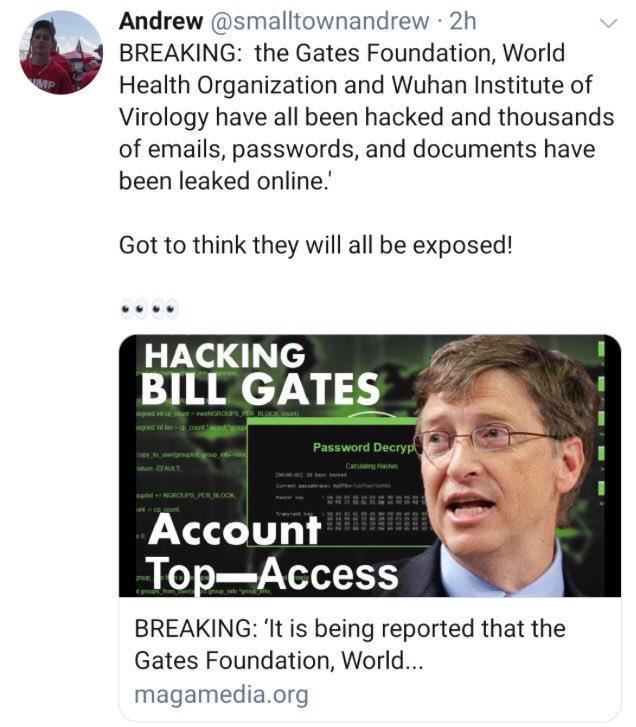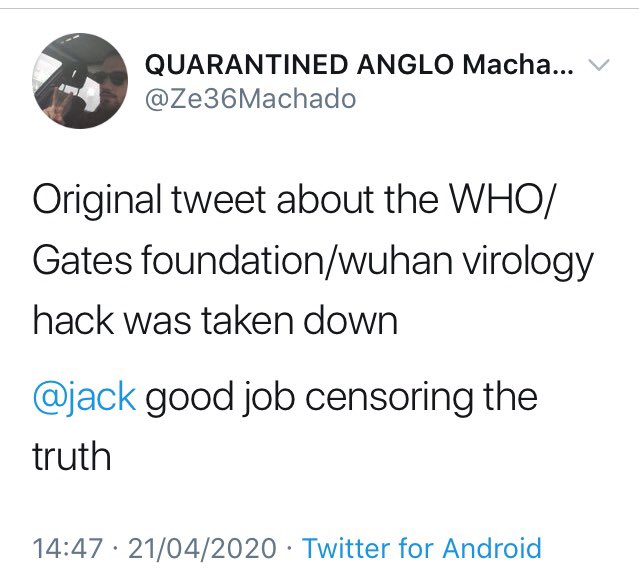Hacking events in 2016—DNC, RNC, state elex systems—are discussed as hard security issues
But hacking is also narrative
These events helped build the information architecture that frames how we discuss the elections
New #defusingdisinfo post for @SURfdn https://standuprepublic.com/what-lessons-havent-we-learned-since-2016-lesson-2-hacking/">https://standuprepublic.com/what-less...
But hacking is also narrative
These events helped build the information architecture that frames how we discuss the elections
New #defusingdisinfo post for @SURfdn https://standuprepublic.com/what-lessons-havent-we-learned-since-2016-lesson-2-hacking/">https://standuprepublic.com/what-less...
What does it mean that hacking is narrative?
We don’t discuss the concept of narrative enough—that is, the purpose of a piece of information, the story that info tells, the framework it contributes to that helps us understand both that info & other info like it in the future.
We don’t discuss the concept of narrative enough—that is, the purpose of a piece of information, the story that info tells, the framework it contributes to that helps us understand both that info & other info like it in the future.
Disinformation is as much about building narrative as the specific tactics that are used to get content in front of us — about the construction of this information architecture that guides how we see and interpret information.
Events contribute to these narratives.
Events like dumping hacked documents on the internet, or hacking critical elections systems and other critical infrastructure.
They can tell a story of doubt, insecurity. They can tell a story of assumed wrongdoing.
Events like dumping hacked documents on the internet, or hacking critical elections systems and other critical infrastructure.
They can tell a story of doubt, insecurity. They can tell a story of assumed wrongdoing.
In 2016, the attempted hacking of elections systems in all 50 states created a narrative of fear that there would be voting irregularities or uncertain results. This captured the attention of the White House, allowing other Kremlin activities to continue unnoticed (relatively)
So, what can you do about it?
Understand the role you play as an individual in spreading/amplifying news stories that have a meaning deeper than the surface.
With stories about hacking in particular, try to understand the broader narrative they contribute to.
Understand the role you play as an individual in spreading/amplifying news stories that have a meaning deeper than the surface.
With stories about hacking in particular, try to understand the broader narrative they contribute to.
Help put the story in that context for others. This can ensure that information can be shared without achieving the narrative goals of attackers.
Example: the maga-web really wants you to believe that this hack happened and thus “proved” a link between Gates, WHO, and Wuhan on COVID (no)
Proof is coming any day, says whatever Q-like prophet these people are snorting. The proof is that there isn’t any! https://abs.twimg.com/emoji/v2/... draggable="false" alt="🙄" title="Face with rolling eyes" aria-label="Emoji: Face with rolling eyes">
https://abs.twimg.com/emoji/v2/... draggable="false" alt="🙄" title="Face with rolling eyes" aria-label="Emoji: Face with rolling eyes">
Proof is coming any day, says whatever Q-like prophet these people are snorting. The proof is that there isn’t any!

 Read on Twitter
Read on Twitter " title="Example: the maga-web really wants you to believe that this hack happened and thus “proved” a link between Gates, WHO, and Wuhan on COVID (no)Proof is coming any day, says whatever Q-like prophet these people are snorting. The proof is that there isn’t any! https://abs.twimg.com/emoji/v2/... draggable="false" alt="🙄" title="Face with rolling eyes" aria-label="Emoji: Face with rolling eyes">">
" title="Example: the maga-web really wants you to believe that this hack happened and thus “proved” a link between Gates, WHO, and Wuhan on COVID (no)Proof is coming any day, says whatever Q-like prophet these people are snorting. The proof is that there isn’t any! https://abs.twimg.com/emoji/v2/... draggable="false" alt="🙄" title="Face with rolling eyes" aria-label="Emoji: Face with rolling eyes">">
 " title="Example: the maga-web really wants you to believe that this hack happened and thus “proved” a link between Gates, WHO, and Wuhan on COVID (no)Proof is coming any day, says whatever Q-like prophet these people are snorting. The proof is that there isn’t any! https://abs.twimg.com/emoji/v2/... draggable="false" alt="🙄" title="Face with rolling eyes" aria-label="Emoji: Face with rolling eyes">">
" title="Example: the maga-web really wants you to believe that this hack happened and thus “proved” a link between Gates, WHO, and Wuhan on COVID (no)Proof is coming any day, says whatever Q-like prophet these people are snorting. The proof is that there isn’t any! https://abs.twimg.com/emoji/v2/... draggable="false" alt="🙄" title="Face with rolling eyes" aria-label="Emoji: Face with rolling eyes">">
 " title="Example: the maga-web really wants you to believe that this hack happened and thus “proved” a link between Gates, WHO, and Wuhan on COVID (no)Proof is coming any day, says whatever Q-like prophet these people are snorting. The proof is that there isn’t any! https://abs.twimg.com/emoji/v2/... draggable="false" alt="🙄" title="Face with rolling eyes" aria-label="Emoji: Face with rolling eyes">">
" title="Example: the maga-web really wants you to believe that this hack happened and thus “proved” a link between Gates, WHO, and Wuhan on COVID (no)Proof is coming any day, says whatever Q-like prophet these people are snorting. The proof is that there isn’t any! https://abs.twimg.com/emoji/v2/... draggable="false" alt="🙄" title="Face with rolling eyes" aria-label="Emoji: Face with rolling eyes">">


